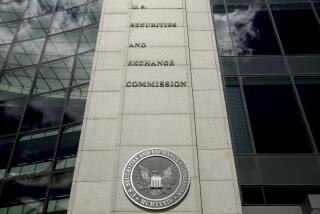Judge Continues Freeze on Assets of Accused Princeton-Newport Officers
- Share via
NEW HAVEN, Conn. — A federal judge Tuesday authorized an order to freeze the assets of six men charged with racketeering in an alleged phony stock trading scheme, including five officers in an investment firm with headquarters in Orange County.
In rejecting the defendants’ request for a stay, Judge Ralph K. Winter of the 2nd U.S. Circuit Court of Appeals left intact a federal district judge’s freeze order. Winter set an Aug. 17 date for a three-judge panel in New York to hear an appeal.
Five of the defendants in the racketeering case are top officers of Princeton-Newport, an investment partnership based in Princeton, N.J., and Newport Beach. The sixth is a former bond trader for Drexel Burnham Lambert Inc.
The judge authorized the government to notify a limited number of financial institutions, partnerships and companies around the country of the order freezing the assets of the six men.
The 2nd Circuit, which covers the states of New York, Connecticut and Vermont and usually sits in New York City, is in recess. Winter agreed to hear arguments in New Haven, where he maintains his office.
The government made no accusations of wrongdoing against any of the firms or banks where assets have been frozen.
The district judge had barred the government from distributing copies of his freeze order pending a hearing on the appeal.
But under Winter’s ruling, the government was permitted to distribute copies to almost two dozen financial institutions, partnerships and corporations around the country, including Goldman, Sachs & Co.; United Jersey Bank; Kidder, Peabody & Co.; Bear, Stearns & Co.; and Morgan Stanley & Co.
Federal prosecutors had sought a much broader release of the order.
“We wanted it to be distributed to everybody,” said Bruce A. Baird, an assistant U.S. attorney.
The six were named last Thursday in a 35-count indictment on charges of racketeering and conspiracy, the first time a racketeering charge has been leveled against securities traders.
The defendants from Princeton-Newport are James Sutton Regan, Jack Z. Rabinowitz, Charles M. Zarzecki, Paul Berkman and Steven Barry Smotrich. None of the five is affiliated with the firm’s Orange County office, which provides computer research and support services for the New Jersey trading operation.
Also named in the case was Bruce Lee Newberg, a former trader of convertible securities for Drexel.
The indictment accuses the six of a multimillion-dollar mail and wire fraud conspiracy to make false stock trades in order to create phony long-term capital gains and short-term capital losses for Princeton-Newport.
The indictment charges that there was a scheme involving the bogus sale of securities between Princeton-Newport and Drexel to create more than $13 million in phony tax losses and avoid regulatory disclosure requirements.
The assets ordered frozen by the courts include those owned by the defendants, as well as the assets of Princeton-Newport, which was not named as a defendant.
The order prohibits Princeton-Newport from diluting any of its assets but does not bar any dealings or transactions that are considered part of the normal course of business.
More than $200 million is invested with the partnership and its subsidiaries by limited partners not named in the case. The five indicted officers have a 6% stake in the companies, a lawyer said Tuesday.
Lawyers for those entities not named as defendants argued the freeze order was too broad and that the district court went beyond its authority in freezing the assets of entities not named as defendants.
The government is entitled only to “restraints on individuals which would bar them from removing any assets from the partnerships,” said attorney William Taylor III.
“The scorched earth policy that underlies this order deserves some attention,” Taylor said.
While responding that some of the indicted officers are managing partners, Winter said he was persuaded that a full appeal should be heard.
More to Read
Sign up for Essential California
The most important California stories and recommendations in your inbox every morning.
You may occasionally receive promotional content from the Los Angeles Times.













